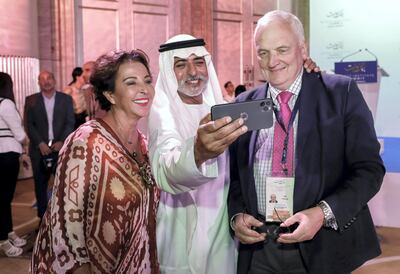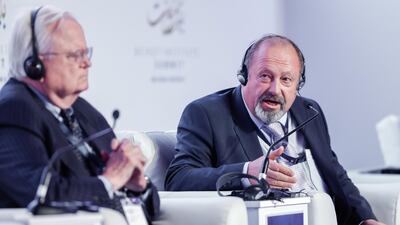Relations between Iran and other Gulf states are likely to remain hostile for the foreseeable future, according to experts who downplayed the prospect of Russian President Vladimir Putin brokering a regional reconciliation.
At the Beirut Institute Summit in Abu Dhabi, academics and diplomats painted a gloomy picture about the prospects of a reduction in tensions, which have risen over recent months following attacks on tankers in the Arabian Gulf and on the world’s largest oil facility in Saudi Arabia that have been blamed on Tehran.
There has been a suggestion that President Putin, the Russian leader who will visit Saudi Arabia and the Gulf this week, could help reduce tensions given his cordial ties with regimes throughout the region.
However, Andrei Fedorov, a former Russian deputy foreign minister, played down Moscow’s influence over Iran. A senior official, he recalled, told him it was “easier to win a chess game with a champion of the world” than to solve the issues in the Gulf region.
“There is a possibility to influence [Tehran],” Mr Fedorov, now chairman of the Russia-based fund for political research and consulting, said. “But this influence should not be over-exaggerated. It’s a limited influence.
“The last meetings between Mr Putin and [Iranian President Hassan] Rouhani, they show that Mr Rouhani is not willing to listen to Russia, he is going on his own way. Iran is trying even to use the current situation to increase its influence, for creating confrontations between Russia, the United States, the EU, etcetera. This is a problem.
“During the coming visit… it will certainly be possible to have a dialogue about the Gulf states and Iran, but knowing Iran, I can say it’s very little hope. Iran is not willing to have a lot of diplomatic dialogue. Iran is now playing on confrontations, and it’s in the interest of Iran to continue playing these confrontations than to go in for dialogue.”
Prince Turki Al Faisal, the Saudi royal and former senior diplomat and head of intelligence, and Abdullatif bin Rashid Al-Zayani, the chair of the Gulf Cooperation Council, said they were open to improved relations with Iran. But, they said, their efforts have been frustrated by Tehran’s aggression and meddling in the internal affairs of Arab countries.
Mahmood Sariolghalam, professor in International Relations at the National University of Iran, said there were “so many incompatibilities” between the outlooks of Iran and its neighbours that improving links would be very difficult.
“For example, the UAE and Saudi Arabia have said so clearly that their national objective is to develop economically and to be part of the international community in terms of technological growth,” he said. “Iran is in a different stage of development and that is why it has to go through its evolution.
“I do not see, in the near future, any possibilities of conflict resolution between Iran and its neighbours. What I think we need to do is focus on conflict management.”
Tensions with Iran have heightened this year, following a string of incidents in the Arabian Gulf and the attack on major Saudi oil facilities in September. Initially, Houthis fighting in Yemen claimed responsibility for the oil facilities attack and Iran denies responsibility, but Saudi Arabia blamed Iran and has been backed by Western allies.

The United States came close to ordering an air strike on Iran over attacks last month, before President Donald Trump called it off at the last minute. But, America has deployed thousands of extra troops to Saudi Arabia in response to the September attacks.
Despite pessimism among his fellow panellists, Robert Blackwill, a former US ambassador who served as a deputy national security adviser under President George W Bush, urged a new diplomatic push between Iran and its regional rivals.
The alternative, he warned, could be catastrophic.
“I’m worried this region will get worse before it gets even worse,” he said, of the tense situation. “I think that we’re at a hinge point and all of the counties of the region, the United States, Russia and others, need to do everything possible diplomatically to try to reduce the likelihood of conflict.
“I think the likelihood of conflict in the next five years is high unless diplomacy becomes more important than military action.”
He emphasised the importance of presenting a united front against Iranian aggression. But added: “I seem to be in a minority here in wanting diplomacy with Iran… we’ve negotiated with a variety of enemies since the end of the Second World War and it is through diplomacy that one at least has an opportunity to reduce stress, tension and reduce the likelihood of conflict.
“If we’re able to deter Iran I think there will be a war and a war will be devastating, not only for Iran but for the region. The question is, and the one I ask to leaders in this area when I meet them, is ‘what is your diplomatic strategy for avoiding a war in the region?’ I have to say, I don’t always get a persuasive answer.”

